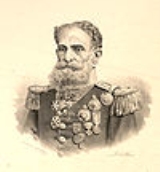
List of Presidents of Brazil
Encyclopedia
This is a list of Presidents
of Brazil
. For a complete list of Brazilians heads of state
, see the list of Brazilian monarchs.
led by Marshal Deodoro da Fonseca
, who deposed the Brazilian Emperor Dom Pedro II
and formed a provisional government. Two years later, in 1891, a constitution was written, based on the federal republic
of the United States of America; the country itself was named the Republic of the United States of Brazil. In accordance with the provisions of the Constitution, the presidents of the Republic were to be elected by direct popular ballot, but, for the first presidential term, the president and vice-president would be chosen by the Constituent Congress; the Constituent Congress was to elect the first president and vice-president immediately after the promulgation of the Constitution. In accordance with those transitional provisions, Congress elected Deodoro the first president of the Republic. His inauguration took place on 26 February, 1891, only two days after the promulgation of the Constitution. Deodoro resigned the presidency ten months later after a coup d'état in which he dissolved Congress was reversed. Then, Floriano Peixoto
, Deodoro's vice-president and an opponent of the coup, was inaugurated. In 1894, Peixoto was succeeded by Prudente de Morais, the first president of Brazil to be elected by direct popular ballot. De Morais, who was the first president to be elected under the permanent provisions of the Constitution adopted in 1891, was also the first civilian to hold the office of president.
Although it was theoretically a constitutional democracy, the Old Republic was characterized by the power of regional oligarchies
and the strict alternation of power between the states of São Paulo and Minas Gerais
. The vote in the countryside was often controlled by the local land owner, and less than 6% of the population had the right to vote due to literacy requirements.
In 1930, when Brazil was suffering the effects of the Wall Street Crash of 1929
, a revolution broke out in the country and the old republic ended. The president Washington Luís, who was supported by São Paulo oligarchies, broke the rule of alternation between São Paulo and Minas and supported a candidate who was also from São Paulo, Júlio Prestes
. Prestes won the rigged election, but Washington Luís was deposed three weeks before the end of his term and Prestes was never inaugurated.
Parties
and in the center-right, PSD – and another anti-Vargas, the rightist UDN.
This period was very unstable. In 1954, Vargas committed suicide during a crisis that threatened his government and he was followed by a series of short-term presidents. In 1961, UDN won national elections for the first time, supporting Jânio Quadros, who himself was a member of a minor party allied to UDN. Quadros, who, before his election, rose meteorically in politics with an anti-corruption stance, unexpectedly resigned the presidency seven months later. Some historians suggest that Quadros was heavily drunk when he signed his resignation letter, while others suggest that Quadros felt that Congress would not accept his vice-president as president, and would ask for his return. Those historians, therefore, see Quadros' resignation as an attempt to return to office with increased powers and more political support. It is possible that both occurred: Quadros was drunk when he resigned, and in that state, he devised the plan to return to power by Congressional request. The plot failed: Congress simply received Quadros' letter, and amid the shock of politicians and of the Nation, the letter was accepted and the president was declared vacant. The president of Congress, Senator Auro de Moura Andrade, took the view that the deed of resignation was the province of the elected president, that it was not subject to a congressional vote, needing no confirmation, and that the president's declaration of resignation was final.
In that time, the president and the vice-president were voted separately. The vice-president was a political enemy of Jânio Quadros, the leftist João Goulart. Goulart was out of the country, and Congress was controlled by right wing politicians. During Goulart's absence, the president of the Chamber of Deputies, Ranieri Mazzilli, took office as acting president. There was then a plot to block the inauguration of the vice-president as president, but Congressional resistance to the inauguration of Goulart led to a reaction by the Governor of Rio Grande do Sul, who led a "legality campaign", and to a split in the military (that, during the second Republic, intervened heavily in politics). Amid the political crisis, the solution was the adoption by Congress of a Constitutional Amendment abolishing the presidential Executive and replacing it with a parliamentary system of Government. Under that negotiated solution, Goulart's inauguration was allowed to proceed, but Goulart would be Head of State only, and a prime minister approved by Congress would lead the government. The new system of government's continued existence was subject to popular approval in a referendum scheduled for 1963. The result of this referedum restored the presidential Executive and a military coup deposed Goulart in 1964, starting the military dictatorship.
Parties
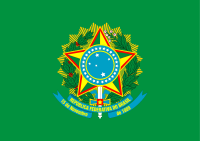 In the early 1980s the military government started a process of gradual political opening, called abertura, the final goal of which was democracy. When the term of the last military president was to end, however, no direct elections for president took place. For the election of the country's first civilian president since the military coup of 1964, the military maintained the rule that prevailed during the dictatorial regime, according to which an Electoral College made up of the entire National Congress and representatives from State Assemblies was to elect the president. This time, however, the Military placed the Electoral College under no coercion, so that its members would be free to select the president of their choice.
In the early 1980s the military government started a process of gradual political opening, called abertura, the final goal of which was democracy. When the term of the last military president was to end, however, no direct elections for president took place. For the election of the country's first civilian president since the military coup of 1964, the military maintained the rule that prevailed during the dictatorial regime, according to which an Electoral College made up of the entire National Congress and representatives from State Assemblies was to elect the president. This time, however, the Military placed the Electoral College under no coercion, so that its members would be free to select the president of their choice.
Tancredo Neves, who had been prime-minister during the presidency of João Goulart, was chosen to be the candidate of PMDB, the major opposition party (and the successor of the MDB Party, that had opposed the Military Regime since its inception), but Tancredo was also supported by a large political spectrum, even including a significant part of former members of ARENA, the party that supported the military presidents. In the last months of the military regime, a large section of ARENA members defected from the Party, and now professed to be men of democratic inclinations. They formed the Liberal Front, and the Liberal Front Party allied itself to PMDB, forming a coalition known as the Democratic Alliance. PMDB needed the Liberal Front's support in order to secure victory in the Electoral College. In the formation of this broad coalition former members of ARENA also switched parties and joined PMDB. So, to seal this arrangement, the spot of vice-president in Tancredo Neves' ticket was given to José Sarney, who represented the former supporters of the regime that had now joined the Democratic Alliance.
On the other hand, those who remained loyal to the military regime and its legacy renamed ARENA as the PDS, and put forward the name of Paulo Maluf as candidate for president. Tancredo's coalition defeated Maluf, and his election was hailed as the dawn of a New Republic.
Although elected president, Tancredo became gravely ill on the eve of his inauguration and died without ever taking office. Therefore, the first civilian president since 1964 was Tancredo's running mate, José Sarney, himself an ex-member of ARENA. José Saynery's administration fulfilled Tancredo's campaign promise of passing a constitutional amendment to the Constitution inherited from the military regime, so as to summon elections for a National Constituent Assembly
with full powers to draft and adopt a new Constitution for the country, to replace the authoritarian legislation that still remained in place.
In October 1988, a new democratic Constitution was passed, and democracy was consolidated.
In 1989, the first elections for president under the new Constitution were held and the young Fernando Collor was elected for a five-year term - the first president to be elected by direct popular ballot since the military coup. He was inaugurated in 1990 and in 1992 he became the first president in Brazil to be impeached due to corruption. A Constitutional Amendment passed in 1993 reduced the presidential term of office of future presidents from five to four years.
In 1995, Fernando Henrique Cardoso was inaugurated for a four-year term. In 1997 a Constitutional Amendment was passed allowing presidents of Brazil to be reelected to one consecutive term. In 1998, then President Fernando Henrique Cardoso became first president of Brazil to be reelected for an immediately consecutive term. In 2003 Luiz Inácio Lula da Silva
was inaugurated. He was reelected in 2006. In 2011 Dilma Rousseff
became Brazil's first woman president.
Parties
President of Brazil
The president of Brazil is both the head of state and head of government of the Federative Republic of Brazil. The president leads the executive branch of the federal government and is the commander-in-chief of the Brazilian Armed Forces...
of Brazil
Brazil
Brazil , officially the Federative Republic of Brazil , is the largest country in South America. It is the world's fifth largest country, both by geographical area and by population with over 192 million people...
. For a complete list of Brazilians heads of state
Head of State
A head of state is the individual that serves as the chief public representative of a monarchy, republic, federation, commonwealth or other kind of state. His or her role generally includes legitimizing the state and exercising the political powers, functions, and duties granted to the head of...
, see the list of Brazilian monarchs.
The old republic (1889-1930)
In 1889 the Republic was proclaimed with a coup d'étatCoup d'état
A coup d'état state, literally: strike/blow of state)—also known as a coup, putsch, and overthrow—is the sudden, extrajudicial deposition of a government, usually by a small group of the existing state establishment—typically the military—to replace the deposed government with another body; either...
led by Marshal Deodoro da Fonseca
Deodoro da Fonseca
Marshal Manuel Deodoro da Fonseca became the first president of the Republic of Brazil after heading a military coup that deposed Emperor Pedro II and proclaimed the Republic in 1889, disestablishing the Empire of Brazil.- Biography :...
, who deposed the Brazilian Emperor Dom Pedro II
Pedro II of Brazil
Dom Pedro II , nicknamed "the Magnanimous", was the second and last ruler of the Empire of Brazil, reigning for over 58 years. Born in Rio de Janeiro, he was the seventh child of Emperor Dom Pedro I of Brazil and Empress Dona Maria Leopoldina and thus a member of the Brazilian branch of...
and formed a provisional government. Two years later, in 1891, a constitution was written, based on the federal republic
Federal republic
A federal republic is a federation of states with a republican form of government. A federation is the central government. The states in a federation also maintain the federation...
of the United States of America; the country itself was named the Republic of the United States of Brazil. In accordance with the provisions of the Constitution, the presidents of the Republic were to be elected by direct popular ballot, but, for the first presidential term, the president and vice-president would be chosen by the Constituent Congress; the Constituent Congress was to elect the first president and vice-president immediately after the promulgation of the Constitution. In accordance with those transitional provisions, Congress elected Deodoro the first president of the Republic. His inauguration took place on 26 February, 1891, only two days after the promulgation of the Constitution. Deodoro resigned the presidency ten months later after a coup d'état in which he dissolved Congress was reversed. Then, Floriano Peixoto
Floriano Peixoto
Floriano Vieira de Araújo Peixoto , April 30, 1839, Maceió, Brazil — July 29, 1895, Rio de Janeiro; born in Ipioca , was a Brazilian soldier and politician, a veteran of the War of the Triple Alliance, and the second President of Brazil.-Election and Succession as President:Floriano Peixoto...
, Deodoro's vice-president and an opponent of the coup, was inaugurated. In 1894, Peixoto was succeeded by Prudente de Morais, the first president of Brazil to be elected by direct popular ballot. De Morais, who was the first president to be elected under the permanent provisions of the Constitution adopted in 1891, was also the first civilian to hold the office of president.
Although it was theoretically a constitutional democracy, the Old Republic was characterized by the power of regional oligarchies
Oligarchy
Oligarchy is a form of power structure in which power effectively rests with an elite class distinguished by royalty, wealth, family ties, commercial, and/or military legitimacy...
and the strict alternation of power between the states of São Paulo and Minas Gerais
Minas Gerais
Minas Gerais is one of the 26 states of Brazil, of which it is the second most populous, the third richest, and the fourth largest in area. Minas Gerais is the Brazilian state with the largest number of Presidents of Brazil, the current one, Dilma Rousseff, being one of them. The capital is the...
. The vote in the countryside was often controlled by the local land owner, and less than 6% of the population had the right to vote due to literacy requirements.
In 1930, when Brazil was suffering the effects of the Wall Street Crash of 1929
Wall Street Crash of 1929
The Wall Street Crash of 1929 , also known as the Great Crash, and the Stock Market Crash of 1929, was the most devastating stock market crash in the history of the United States, taking into consideration the full extent and duration of its fallout...
, a revolution broke out in the country and the old republic ended. The president Washington Luís, who was supported by São Paulo oligarchies, broke the rule of alternation between São Paulo and Minas and supported a candidate who was also from São Paulo, Júlio Prestes
Júlio Prestes
Júlio Prestes de Albuquerque was a Brazilian politician. Governor of São Paulo state in 1926, he was elected president of Brazil on March 1, 1930, but never took office because the government was overthrown in the Revolution of 1930 that brought Getulio Vargas to power, three weeks before Prestes'...
. Prestes won the rigged election, but Washington Luís was deposed three weeks before the end of his term and Prestes was never inaugurated.
Parties
| # | President | Picture | Elected | Took office | Left office | Political Party | Vice President(s) |
|---|---|---|---|---|---|---|---|
| 1 | Deodoro da Fonseca Deodoro da Fonseca Marshal Manuel Deodoro da Fonseca became the first president of the Republic of Brazil after heading a military coup that deposed Emperor Pedro II and proclaimed the Republic in 1889, disestablishing the Empire of Brazil.- Biography :... |
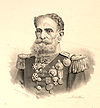 |
1891 Brazilian presidential election, 1891 The Brazilian presidential election of 1891 was the first presidential election held in Brazil. The president was elected by the Congress and resulted in the election as President of Manuel Deodoro da Fonseca,... |
(Head of the Provisional Government since 15 November 1889) 26 February 1891 |
23 November 1891 | None (military) | Floriano Peixoto Floriano Peixoto Floriano Vieira de Araújo Peixoto , April 30, 1839, Maceió, Brazil — July 29, 1895, Rio de Janeiro; born in Ipioca , was a Brazilian soldier and politician, a veteran of the War of the Triple Alliance, and the second President of Brazil.-Election and Succession as President:Floriano Peixoto... |
| 2 | Floriano Peixoto Floriano Peixoto Floriano Vieira de Araújo Peixoto , April 30, 1839, Maceió, Brazil — July 29, 1895, Rio de Janeiro; born in Ipioca , was a Brazilian soldier and politician, a veteran of the War of the Triple Alliance, and the second President of Brazil.-Election and Succession as President:Floriano Peixoto... |
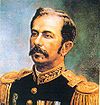 |
— | 23 November 1891 | 14 November 1894 | None (military) | vacant |
| 3 | Prudente de Morais Prudente de Morais Prudente José de Morais Barros was the third president of Brazil . His presidency lasted from November 15, 1894 until November 15, 1898... |
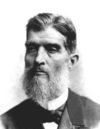 |
1894 Brazilian presidential election, 1894 The Brazilian presidential election of 1894 was held on March 1, 1894. The president was elected by popular vote for the first time.-Results:-See also:*President of Brazil*Politics of Brazil*List of political parties in Brazil... |
15 November 1894 | 14 November 1898 | Federal Republican Party (PR Fed) | Manuel Vitorino Manuel Vitorino Manuel Vitorino Pereira was a former Governor of Bahia and a Vice-President under Prudente de Morais. He was a writer and a physician before entering politics.... (PR Fed) |
| 4 | Campos Sales | 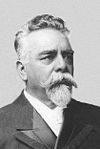 |
1898 Brazilian presidential election, 1898 The Brazilian presidential election of 1898 was held on March 1, 1898. The president was elected by popular vote.-Results:-See also:*President of Brazil*Politics of Brazil*List of political parties in Brazil... |
15 November 1898 | 14 November 1902 | São Paulo Republican Party (PRP) Republican Party of São Paulo The Republican Party of São Paulo a.k.a Partido Republicano Paulista or PRP was a Brazilian political party founded on April 18, 1873 during the Itu Convention and sparked the first modern republican movement in Brazil.... |
Rosa e Silva |
| 5 | Rodrigues Alves | 1902 Brazilian presidential election, 1902 The Brazilian presidential election of 1902 was held on March 1, 1902. The president was elected by popular vote.-Results:-See also:*President of Brazil*Politics of Brazil*List of political parties in Brazil... |
15 November 1902 | 14 November 1906 | São Paulo Republican Party (PRP) Republican Party of São Paulo The Republican Party of São Paulo a.k.a Partido Republicano Paulista or PRP was a Brazilian political party founded on April 18, 1873 during the Itu Convention and sparked the first modern republican movement in Brazil.... |
Silviano Brandão (PRM Mineiro Republican Party The Mineiro Republican Party was a Brazilian political party founded on 4 June 1888 and active during the República Velha. It represented the republican ideology of the agrarian elite of the state of Minas Gerais.It was initially controlled by politicians of the Sul de Minas until Artur Bernardes... ) |
|
| Afonso Pena (PRM Mineiro Republican Party The Mineiro Republican Party was a Brazilian political party founded on 4 June 1888 and active during the República Velha. It represented the republican ideology of the agrarian elite of the state of Minas Gerais.It was initially controlled by politicians of the Sul de Minas until Artur Bernardes... ) |
|||||||
| 6 | Afonso Pena | 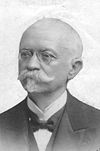 |
1906 Brazilian presidential election, 1906 The Brazilian presidential election of 1906 was held on March 1, 1906. The president was elected by popular vote. Afonso Pena was elected unopposed after Lauro Sodré dropped out of the race.-Results:-See also:*President of Brazil*Politics of Brazil... |
15 November 1906 | 14 June 1909 | Mineiro Republican Party (PRM) Mineiro Republican Party The Mineiro Republican Party was a Brazilian political party founded on 4 June 1888 and active during the República Velha. It represented the republican ideology of the agrarian elite of the state of Minas Gerais.It was initially controlled by politicians of the Sul de Minas until Artur Bernardes... |
Nilo Peçanha Nilo Peçanha Nilo Procópio Peçanha was a Brazilian politician. Governor of Rio de Janeiro State . Elected vice-president in 1906, he assumed the presidency in 1909 following the death of President Afonso Pena and served until 1910... (PRF) |
| 7 | Nilo Peçanha Nilo Peçanha Nilo Procópio Peçanha was a Brazilian politician. Governor of Rio de Janeiro State . Elected vice-president in 1906, he assumed the presidency in 1909 following the death of President Afonso Pena and served until 1910... |
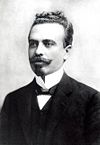 |
— | 14 June 1909 | 14 November 1910 | Rio Republican Party (PRF) Rio Republican Party The Rio Republican Party ) ws a Brazilian political party founded in 1888 to represent the republican ideals of the agrarian elite of Rio de Janeiro. Its principal representative was the Florianist Nilo Peçanha, President of the Republic from 1909 to 1910... |
vacant |
| 8 | Hermes da Fonseca |  |
1910 Brazilian presidential election, 1910 The Brazilian presidential election of 1910 was held on March 1, 1910. The president was elected by popular vote. Hermes da Fonseca, a military man, was elected President of Brazil in a close and active campaign against the liberal thinker Rui Barbosa. Barbosa's defeat was probably due to electoral... |
15 November 1910 | 14 November 1914 | Conservative Republican Party (PRC) Conservative Republican Party The Conservative Republican Party ) was a Brazilian political party founded in October 1910 to represent the Republican and oligarchic ideals of agrarian elites of states discontented with the domination of the states of São Paulo and Minas Gerais during the República Velha.Its main... |
Venceslau Brás Venceslau Brás Pereira Gomes Venceslau Brás Pereira Gomes was a Brazilian politician. Brás was born in Brasópolis , Minas Gerais State. He became governor of that state in 1909, and in 1910 he was elected vice-president under Hermes Rodrigues da Fonseca. He was elected president in 1914 and served until 1918. He declared war... (PRM Mineiro Republican Party The Mineiro Republican Party was a Brazilian political party founded on 4 June 1888 and active during the República Velha. It represented the republican ideology of the agrarian elite of the state of Minas Gerais.It was initially controlled by politicians of the Sul de Minas until Artur Bernardes... ) |
| 9 | Venceslau Brás | 1914 Brazilian presidential election, 1914 The Brazilian presidential election of 1914 was held on March 1, 1914. The president was elected by popular vote.-Results:-See also:*President of Brazil*Politics of Brazil*List of political parties in Brazil... |
15 November 1914 | 14 November 1918 | Mineiro Republican Party (PRM) Mineiro Republican Party The Mineiro Republican Party was a Brazilian political party founded on 4 June 1888 and active during the República Velha. It represented the republican ideology of the agrarian elite of the state of Minas Gerais.It was initially controlled by politicians of the Sul de Minas until Artur Bernardes... |
Urbano Santos Urbano Santos Urbano Santos is a town and municipality in the state of Maranhão in the Northeast region of Brazil.-References:... |
|
| – | Rodrigues Alves | 1918 Brazilian presidential election, 1918 The Brazilian presidential election of 1918 was held on March 1, 1918. The president was elected by popular vote.-Results:Rodrigues Alves never took office since he died of the Spanish flu in 1919... |
Never took office. | São Paulo Republican Party (PRP) Republican Party of São Paulo The Republican Party of São Paulo a.k.a Partido Republicano Paulista or PRP was a Brazilian political party founded on April 18, 1873 during the Itu Convention and sparked the first modern republican movement in Brazil.... |
Delfim Moreira Delfim Moreira Delfim Moreira da Costa Ribeiro was a Brazilian politician. He was born in Minas Gerais state, and was elected vice-president in 1918. He assumed the presidency on November 15, 1918, due to the illness and death of former and now elect president Rodrigues Alves. However, Moreira suffered from... (PRM Mineiro Republican Party The Mineiro Republican Party was a Brazilian political party founded on 4 June 1888 and active during the República Velha. It represented the republican ideology of the agrarian elite of the state of Minas Gerais.It was initially controlled by politicians of the Sul de Minas until Artur Bernardes... ) |
||
| 10 | Delfim Moreira Delfim Moreira Delfim Moreira da Costa Ribeiro was a Brazilian politician. He was born in Minas Gerais state, and was elected vice-president in 1918. He assumed the presidency on November 15, 1918, due to the illness and death of former and now elect president Rodrigues Alves. However, Moreira suffered from... |
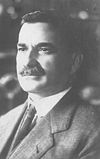 |
— | (Acting President from 15 November 1918) 16 January 1919 |
28 July 1919 | Mineiro Republican Party (PRM) Mineiro Republican Party The Mineiro Republican Party was a Brazilian political party founded on 4 June 1888 and active during the República Velha. It represented the republican ideology of the agrarian elite of the state of Minas Gerais.It was initially controlled by politicians of the Sul de Minas until Artur Bernardes... |
vacant |
| 11 | Epitácio Pessoa Epitácio Pessoa Epitácio Lindolfo da Silva Pessoa was a Brazilian politician and jurist, and president of the republic between 1919 and 1922, when Rodrigues Alves could not take office due to illness after being elected in 1918... |
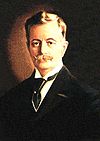 |
1919 Brazilian presidential election, 1919 The Brazilian presidential election of 1919 was held on April 12, 1919. The president was elected by popular vote.-Results:-See also:*President of Brazil*Politics of Brazil*List of political parties in Brazil... |
28 July 1919 | 14 November 1922 | Mineiro Republican Party (PRM) Mineiro Republican Party The Mineiro Republican Party was a Brazilian political party founded on 4 June 1888 and active during the República Velha. It represented the republican ideology of the agrarian elite of the state of Minas Gerais.It was initially controlled by politicians of the Sul de Minas until Artur Bernardes... |
Delfim Moreira Delfim Moreira Delfim Moreira da Costa Ribeiro was a Brazilian politician. He was born in Minas Gerais state, and was elected vice-president in 1918. He assumed the presidency on November 15, 1918, due to the illness and death of former and now elect president Rodrigues Alves. However, Moreira suffered from... (PRM Mineiro Republican Party The Mineiro Republican Party was a Brazilian political party founded on 4 June 1888 and active during the República Velha. It represented the republican ideology of the agrarian elite of the state of Minas Gerais.It was initially controlled by politicians of the Sul de Minas until Artur Bernardes... ) |
| Bueno de Paiva (PRM Mineiro Republican Party The Mineiro Republican Party was a Brazilian political party founded on 4 June 1888 and active during the República Velha. It represented the republican ideology of the agrarian elite of the state of Minas Gerais.It was initially controlled by politicians of the Sul de Minas until Artur Bernardes... ) |
|||||||
| 12 | Artur Bernardes | 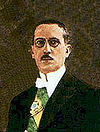 |
1922 Brazilian presidential election, 1922 The Brazilian presidential election of 1922 was held on March 1, 1922. The president was elected by popular vote.-Results:-See also:*President of Brazil*Politics of Brazil*List of political parties in Brazil... |
15 November 1922 | 14 November 1926 | Mineiro Republican Party (PRM) Mineiro Republican Party The Mineiro Republican Party was a Brazilian political party founded on 4 June 1888 and active during the República Velha. It represented the republican ideology of the agrarian elite of the state of Minas Gerais.It was initially controlled by politicians of the Sul de Minas until Artur Bernardes... |
Estacio Coimbra |
| 13 | Washington Luís Washington Luís Pereira de Sousa Washington Luís Pereira de Sousa was a Brazilian politician. His family was of Portuguese Romani descent. He was born in Macaé, Rio de Janeiro, and moved to São Paulo, where he became a lawyer. Elected governor of São Paulo state in 1920 and president of Brazil in 1926, Washington Luís was the... |
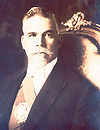 |
1926 Brazilian presidential election, 1926 The Brazilian presidential election of 1926 was held on March 1, 1926. The president was elected by popular vote.-Results:-See also:*President of Brazil*Politics of Brazil*List of political parties in Brazil... |
15 November 1926 | 24 October 1930 | São Paulo Republican Party (PRP) Republican Party of São Paulo The Republican Party of São Paulo a.k.a Partido Republicano Paulista or PRP was a Brazilian political party founded on April 18, 1873 during the Itu Convention and sparked the first modern republican movement in Brazil.... |
Melo Viana (PRM Mineiro Republican Party The Mineiro Republican Party was a Brazilian political party founded on 4 June 1888 and active during the República Velha. It represented the republican ideology of the agrarian elite of the state of Minas Gerais.It was initially controlled by politicians of the Sul de Minas until Artur Bernardes... ) |
| – | Júlio Prestes Júlio Prestes Júlio Prestes de Albuquerque was a Brazilian politician. Governor of São Paulo state in 1926, he was elected president of Brazil on March 1, 1930, but never took office because the government was overthrown in the Revolution of 1930 that brought Getulio Vargas to power, three weeks before Prestes'... |
 |
1930 Brazilian presidential election, 1930 The Brazilian presidential election of 1930 was held on March 1, 1930. Getulio Vargas, supported by the Liberal Alliance was defeated by the Republican Party of São Paulo candidate, Júlio Prestes... |
Never took office. | São Paulo Republican Party (PRP) Republican Party of São Paulo The Republican Party of São Paulo a.k.a Partido Republicano Paulista or PRP was a Brazilian political party founded on April 18, 1873 during the Itu Convention and sparked the first modern republican movement in Brazil.... |
Vital Soares Vital Soares Vital Henrique Batista Soares was a Brazilian lawyer and politician. He served as a Governor of Bahia from 1928 to 1930.... |
|
Vargas era (1930-1946)
Parties freedom deeply suppressed:| # | President | Picture | Took office | Left office | Political Party | Vice President(s) |
|---|---|---|---|---|---|---|
| – | Augusto Fragoso, Isaías de Noronha Isaías de Noronha Admiral José Isaías de Noronha was one of the leaders of the junta that governed Brazil during the time Washington Luís was deposed.... , and Mena Barreto |
 |
24 October 1930 | 3 November 1930 | None (provisional military junta) |
vacant |
| 14 | Getúlio Vargas Getúlio Vargas Getúlio Dornelles Vargas served as President of Brazil, first as dictator, from 1930 to 1945, and in a democratically elected term from 1951 until his suicide in 1954. Vargas led Brazil for 18 years, the most for any President, and second in Brazilian history to Emperor Pedro II... |
(Head of the Provisional Government since 3 November 1930) 20 July 1934 |
29 October 1945 | Liberal Alliance (AL) | vacant | |
| 15 | José Linhares José Linhares José Linhares, .Brazilian Chief of Justice and lifetime senator. Assumed the presidency of Brazil in 1945–1946, between the deposition of Getúlio Vargas and the oath of Eurico Gaspar Dutra. During his provisional administration, measures were taken to re-establish a democratic system of... |
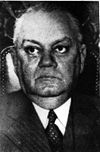 |
29 October 1945 | 31 January 1946 | None (President of the Supreme Federal Court) |
vacant |
The second republic (1946-1964)
In 1945, Vargas was deposed by a military coup led by two ex-supporters. Nevertheless, he would be elected president once again and his influence in Brazilian politics would remain until the end of the second republic. In this period, three parties dominated the national politics. Two were pro-Vargas – in the left, PTBBrazilian Labour Party (historical)
The Brazilian Labour Party was a center-left populist political party in Brazil founded in 1945 by supporters of the late Getúlio Vargas. It was dismantled by the military after 1964 coup d'état.-History:...
and in the center-right, PSD – and another anti-Vargas, the rightist UDN.
This period was very unstable. In 1954, Vargas committed suicide during a crisis that threatened his government and he was followed by a series of short-term presidents. In 1961, UDN won national elections for the first time, supporting Jânio Quadros, who himself was a member of a minor party allied to UDN. Quadros, who, before his election, rose meteorically in politics with an anti-corruption stance, unexpectedly resigned the presidency seven months later. Some historians suggest that Quadros was heavily drunk when he signed his resignation letter, while others suggest that Quadros felt that Congress would not accept his vice-president as president, and would ask for his return. Those historians, therefore, see Quadros' resignation as an attempt to return to office with increased powers and more political support. It is possible that both occurred: Quadros was drunk when he resigned, and in that state, he devised the plan to return to power by Congressional request. The plot failed: Congress simply received Quadros' letter, and amid the shock of politicians and of the Nation, the letter was accepted and the president was declared vacant. The president of Congress, Senator Auro de Moura Andrade, took the view that the deed of resignation was the province of the elected president, that it was not subject to a congressional vote, needing no confirmation, and that the president's declaration of resignation was final.
In that time, the president and the vice-president were voted separately. The vice-president was a political enemy of Jânio Quadros, the leftist João Goulart. Goulart was out of the country, and Congress was controlled by right wing politicians. During Goulart's absence, the president of the Chamber of Deputies, Ranieri Mazzilli, took office as acting president. There was then a plot to block the inauguration of the vice-president as president, but Congressional resistance to the inauguration of Goulart led to a reaction by the Governor of Rio Grande do Sul, who led a "legality campaign", and to a split in the military (that, during the second Republic, intervened heavily in politics). Amid the political crisis, the solution was the adoption by Congress of a Constitutional Amendment abolishing the presidential Executive and replacing it with a parliamentary system of Government. Under that negotiated solution, Goulart's inauguration was allowed to proceed, but Goulart would be Head of State only, and a prime minister approved by Congress would lead the government. The new system of government's continued existence was subject to popular approval in a referendum scheduled for 1963. The result of this referedum restored the presidential Executive and a military coup deposed Goulart in 1964, starting the military dictatorship.
Parties
| # | President | Picture | Elected | Took office | Left office | Political Party | Vice President(s) |
|---|---|---|---|---|---|---|---|
| 16 | Gaspar Dutra Eurico Gaspar Dutra Eurico Gaspar Dutra , was a Brazilian marshal, politician and president of Brazil from 1946–1951.He was born in Cuiabá, Mato Grosso, and like many other Brazilians, was from Azorean-Portuguese origin... |
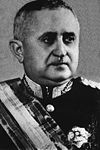 |
1945 Brazilian presidential election, 1945 Presidential elections were held in Brazil on December 2, 1945. These were the first elections since the establishment of Getúlio Vargas' Estado Novo.-Historical context:... |
31 January 1946 | 30 January 1951 | Social Democratic Party (PSD) Social Democratic Party (Brazil) The Social Democratic Party was a liberal political party in Brazil between 1945 and 1965. Founded as a center-right party by Getúlio Vargas together with the left-leaning Brazilian Labour Party, it elected Presidents Eurico Gaspar Dutra in 1945 and Juscelino Kubitschek de Oliveira in 1955... (military) |
Nereu Ramos (PSD Social Democratic Party (Brazil) The Social Democratic Party was a liberal political party in Brazil between 1945 and 1965. Founded as a center-right party by Getúlio Vargas together with the left-leaning Brazilian Labour Party, it elected Presidents Eurico Gaspar Dutra in 1945 and Juscelino Kubitschek de Oliveira in 1955... ) |
| 17 | Getúlio Vargas Getúlio Vargas Getúlio Dornelles Vargas served as President of Brazil, first as dictator, from 1930 to 1945, and in a democratically elected term from 1951 until his suicide in 1954. Vargas led Brazil for 18 years, the most for any President, and second in Brazilian history to Emperor Pedro II... |
1950 Brazilian presidential election, 1950 -Historical context:After living in self-imposed exile in his Riograndense ranch between his overthrow in 1945 and 1950, former President Getúlio Vargas decided to run for the Presidency, as the candidate of the Brazilian Labor Party , one of the two he founded after he decided to put an end to his... |
31 January 1951 | 24 August 1954 | Brazilian Labour Party (PTB) Brazilian Labour Party (historical) The Brazilian Labour Party was a center-left populist political party in Brazil founded in 1945 by supporters of the late Getúlio Vargas. It was dismantled by the military after 1964 coup d'état.-History:... |
Café Filho (PSP) |
|
| 18 | Café Filho | 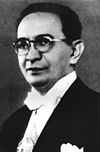 |
— | 24 August 1954 | (under leave of absence from 9 November 1955) 30 January 1956 |
Progressive Social Party (PSP) | vacant |
| 19 | Carlos Luz (Acting President for Café Filho) |
 |
— | 9 November 1955 | 11 November 1955 | Social Democratic Party (PSD) Social Democratic Party (Brazil) The Social Democratic Party was a liberal political party in Brazil between 1945 and 1965. Founded as a center-right party by Getúlio Vargas together with the left-leaning Brazilian Labour Party, it elected Presidents Eurico Gaspar Dutra in 1945 and Juscelino Kubitschek de Oliveira in 1955... |
vacant |
| 20 | Nereu Ramos (Acting President for Café Filho) |
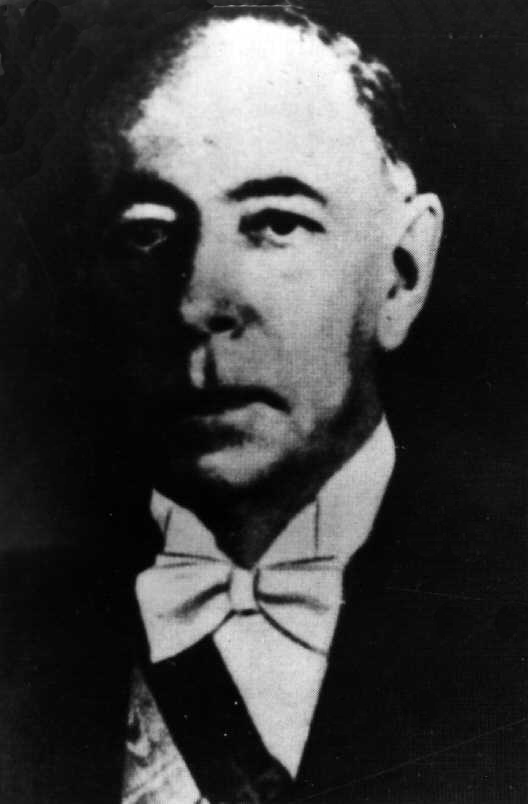 |
— | 11 November 1955 | 30 January 1956 | Social Democratic Party (PSD) Social Democratic Party (Brazil) The Social Democratic Party was a liberal political party in Brazil between 1945 and 1965. Founded as a center-right party by Getúlio Vargas together with the left-leaning Brazilian Labour Party, it elected Presidents Eurico Gaspar Dutra in 1945 and Juscelino Kubitschek de Oliveira in 1955... |
vacant |
| 21 | Juscelino Kubitschek | 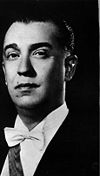 |
1955 Brazilian presidential election, 1955 -Historical context:After the suicide of Getúlio Vargas, his Vice President João Café Filho took office. Prior to Vargas' death, Brazil was living a time of intense political division, with the right-wing opposition National Democratic Union , high-level military officers and the mass media openly... |
31 January 1956 | 30 January 1961 | Social Democratic Party (PSD) Social Democratic Party (Brazil) The Social Democratic Party was a liberal political party in Brazil between 1945 and 1965. Founded as a center-right party by Getúlio Vargas together with the left-leaning Brazilian Labour Party, it elected Presidents Eurico Gaspar Dutra in 1945 and Juscelino Kubitschek de Oliveira in 1955... |
João Goulart João Goulart João Belchior Marques Goulart was a Brazilian politician and the 24th President of Brazil until a military coup d'état deposed him on April 1, 1964. He is considered to have been the last left-wing President of the country until Luiz Inácio Lula da Silva took office in 2003.-Name:João Goulart is... (PTB Brazilian Labour Party (historical) The Brazilian Labour Party was a center-left populist political party in Brazil founded in 1945 by supporters of the late Getúlio Vargas. It was dismantled by the military after 1964 coup d'état.-History:... ) |
| 22 | Jânio Quadros Jânio Quadros Jânio da Silva Quadros , , was a Brazilian politician who served as President of Brazil for only 7 months in 1961.-Career:... |
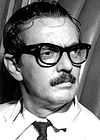 |
1960 | 31 January 1961 | 25 August 1961 | National Labour Party (PTN) National Labour Party (Brazil) The National Labour Party is a tiny populist-centrist Brazilian political party originally founded in 1945.It was founded by dissidents from the Brazilian Labor Party in 1945, and supported the winning candidacy of Jânio Quadros in 1960. It was abolished by the military regime in 1965.It was... |
|
| 23 | Ranieri Mazzilli (Acting President) |
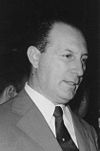 |
— | 25 August 1961 | 7 September 1961 | Social Democratic Party (PSD) Social Democratic Party (Brazil) The Social Democratic Party was a liberal political party in Brazil between 1945 and 1965. Founded as a center-right party by Getúlio Vargas together with the left-leaning Brazilian Labour Party, it elected Presidents Eurico Gaspar Dutra in 1945 and Juscelino Kubitschek de Oliveira in 1955... |
vacant |
| 24 | João Goulart João Goulart João Belchior Marques Goulart was a Brazilian politician and the 24th President of Brazil until a military coup d'état deposed him on April 1, 1964. He is considered to have been the last left-wing President of the country until Luiz Inácio Lula da Silva took office in 2003.-Name:João Goulart is... |
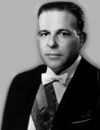 |
— | 7 September 1961 | 1 April 1964 | Brazilian Labour Party (PTB) Brazilian Labour Party (historical) The Brazilian Labour Party was a center-left populist political party in Brazil founded in 1945 by supporters of the late Getúlio Vargas. It was dismantled by the military after 1964 coup d'état.-History:... |
vacant |
The military dictatorship (1964-1985)
Parties abolished, except for| # | President | Picture | Took office | Left office | Political Party | Vice President(s) |
|---|---|---|---|---|---|---|
| 25 | Ranieri Mazzilli |  |
1 April 1964 | 15 April 1964 | Social Democratic Party (PSD) Social Democratic Party (Brazil) The Social Democratic Party was a liberal political party in Brazil between 1945 and 1965. Founded as a center-right party by Getúlio Vargas together with the left-leaning Brazilian Labour Party, it elected Presidents Eurico Gaspar Dutra in 1945 and Juscelino Kubitschek de Oliveira in 1955... |
vacant |
| 26 | Castelo Branco Humberto de Alencar Castelo Branco Marshal Humberto de Alencar Castelo Branco was a Brazilian military leader and politician.He was President of Brazil, as a military dictator, after the 1964 coup d'etat... |
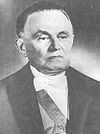 |
15 April 1964 | 14 March 1967 | National Renewal Alliance Party (ARENA) National Renewal Alliance Party The National Renewal Alliance Party or Aliança Renovadora Nacional was a conservative political party that existed in Brazil between 1966 and 1985... (military) |
José Maria Alkmin José Maria Alkmin José Maria Alkmin was Vice-President of Brazil from 1964 to 1967. He had been finance minister before becoming vice president. He was also once the Partido Social Democrático's deputy.- References :... (PSD Social Democratic Party (Brazil) The Social Democratic Party was a liberal political party in Brazil between 1945 and 1965. Founded as a center-right party by Getúlio Vargas together with the left-leaning Brazilian Labour Party, it elected Presidents Eurico Gaspar Dutra in 1945 and Juscelino Kubitschek de Oliveira in 1955... • ARENA National Renewal Alliance Party The National Renewal Alliance Party or Aliança Renovadora Nacional was a conservative political party that existed in Brazil between 1966 and 1985... ) |
| 27 | Costa e Silva Artur da Costa e Silva Artur da Costa e Silva was a Brazilian Army General, the second President of Brazil during the military regime set up by the 1964 coup d'état; he was born only a month before the coup that overthrow Dom Pedro II. He was married to Iolanda Barbosa Costa e Silva, the daughter of a soldier... |
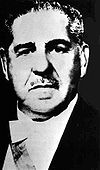 |
15 March 1967 | 31 August 1969 (suspended due to ill health) 14 October 1969 (removed) |
National Renewal Alliance Party (ARENA) National Renewal Alliance Party The National Renewal Alliance Party or Aliança Renovadora Nacional was a conservative political party that existed in Brazil between 1966 and 1985... (military) |
Pedro Aleixo Pedro Aleixo Pedro Aleixo served as President of the Chamber of Deputies in 1937 and as Vice-President of Brazil from March 15, 1967 to October 14, 1969.... (ARENA National Renewal Alliance Party The National Renewal Alliance Party or Aliança Renovadora Nacional was a conservative political party that existed in Brazil between 1966 and 1985... ) |
| – | Augusto Rademaker Augusto Hamann Rademaker Grünewald Augusto Hamann Rademaker Grünewald was an admiral in the Brazilian navy. Grünewald was one of the military in the Military Junta that ruled Brazil between the illness of Artur da Costa e Silva in August 1969 and the investiture ceremony of Emílio Garrastazú Médici in October of that same year,... , Aurélio de Lira, and Márcio Melo |
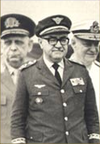 |
31 August 1969 | 30 October 1969 | None (military junta) |
vacant |
| 28 | Emilio Medici Emílio Garrastazu Médici Emílio Garrastazu Médici, was a Brazilian military leader and politician. His rightist rule from 1969 to 1974, marked the apex of military governments in Brazil.-Early life:... |
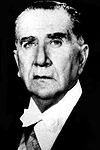 |
30 October 1969 | 14 March 1974 | National Renewal Alliance Party (ARENA) National Renewal Alliance Party The National Renewal Alliance Party or Aliança Renovadora Nacional was a conservative political party that existed in Brazil between 1966 and 1985... (military) |
Augusto Rademaker Augusto Hamann Rademaker Grünewald Augusto Hamann Rademaker Grünewald was an admiral in the Brazilian navy. Grünewald was one of the military in the Military Junta that ruled Brazil between the illness of Artur da Costa e Silva in August 1969 and the investiture ceremony of Emílio Garrastazú Médici in October of that same year,... (ARENA National Renewal Alliance Party The National Renewal Alliance Party or Aliança Renovadora Nacional was a conservative political party that existed in Brazil between 1966 and 1985... ) |
| 29 | Ernesto Geisel Ernesto Geisel Ernesto Beckmann Geisel, was a Brazilian military leader and politician of German descent who was President of Brazil from 1974 to 1979.-Early life and family:... |
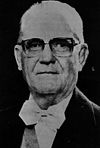 |
15 March 1974 | 14 March 1979 | National Renewal Alliance Party (ARENA) National Renewal Alliance Party The National Renewal Alliance Party or Aliança Renovadora Nacional was a conservative political party that existed in Brazil between 1966 and 1985... (military) |
Adalberto Pereira dos Santos (ARENA National Renewal Alliance Party The National Renewal Alliance Party or Aliança Renovadora Nacional was a conservative political party that existed in Brazil between 1966 and 1985... ) |
| 30 | João Figueiredo | 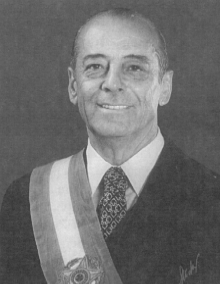 |
15 March 1979 | 14 March 1985 | Democratic Social Party (PDS) Democratic Social Party The Democratic Social Party was a conservative Brazilian political party.It was established in 1979 as a continuation of the National Renewal Alliance Party , the party which supported the 1965-79 Brazilian dictatorship, at a time in which the country turned to be a democracy... (military) |
Aureliano Chaves Aureliano Chaves Aureliano Chaves was a Brazilian politician.Born in Três Pontas, state of Minas Gerais, he was a Representative of this state in the Chamber of Deputies in 1967 from the ARENA party. He was selected as the governor of Minas Gerais state from 1975 to 1978 and was elected vice-president in 1979... (ARENA National Renewal Alliance Party The National Renewal Alliance Party or Aliança Renovadora Nacional was a conservative political party that existed in Brazil between 1966 and 1985... ) |
The new republic (1985-present)

Tancredo Neves, who had been prime-minister during the presidency of João Goulart, was chosen to be the candidate of PMDB, the major opposition party (and the successor of the MDB Party, that had opposed the Military Regime since its inception), but Tancredo was also supported by a large political spectrum, even including a significant part of former members of ARENA, the party that supported the military presidents. In the last months of the military regime, a large section of ARENA members defected from the Party, and now professed to be men of democratic inclinations. They formed the Liberal Front, and the Liberal Front Party allied itself to PMDB, forming a coalition known as the Democratic Alliance. PMDB needed the Liberal Front's support in order to secure victory in the Electoral College. In the formation of this broad coalition former members of ARENA also switched parties and joined PMDB. So, to seal this arrangement, the spot of vice-president in Tancredo Neves' ticket was given to José Sarney, who represented the former supporters of the regime that had now joined the Democratic Alliance.
On the other hand, those who remained loyal to the military regime and its legacy renamed ARENA as the PDS, and put forward the name of Paulo Maluf as candidate for president. Tancredo's coalition defeated Maluf, and his election was hailed as the dawn of a New Republic.
Although elected president, Tancredo became gravely ill on the eve of his inauguration and died without ever taking office. Therefore, the first civilian president since 1964 was Tancredo's running mate, José Sarney, himself an ex-member of ARENA. José Saynery's administration fulfilled Tancredo's campaign promise of passing a constitutional amendment to the Constitution inherited from the military regime, so as to summon elections for a National Constituent Assembly
1988 Constituent Assembly
The 1988 Constituent Assembly , also known as the National Constituent Assembly was a constituent assembly held in Brasília to establish Brazil's new democratic Constitution after 21 years under military rule. On November 1986, general elections were held to elect the members of the Constituent...
with full powers to draft and adopt a new Constitution for the country, to replace the authoritarian legislation that still remained in place.
In October 1988, a new democratic Constitution was passed, and democracy was consolidated.
In 1989, the first elections for president under the new Constitution were held and the young Fernando Collor was elected for a five-year term - the first president to be elected by direct popular ballot since the military coup. He was inaugurated in 1990 and in 1992 he became the first president in Brazil to be impeached due to corruption. A Constitutional Amendment passed in 1993 reduced the presidential term of office of future presidents from five to four years.
In 1995, Fernando Henrique Cardoso was inaugurated for a four-year term. In 1997 a Constitutional Amendment was passed allowing presidents of Brazil to be reelected to one consecutive term. In 1998, then President Fernando Henrique Cardoso became first president of Brazil to be reelected for an immediately consecutive term. In 2003 Luiz Inácio Lula da Silva
Luiz Inácio Lula da Silva
Luiz Inácio Lula da Silva , known popularly as Lula, served as the 35th President of Brazil from 2003 to 2010.A founding member of the Workers' Party , he ran for President three times unsuccessfully, first in the 1989 election. Lula achieved victory in the 2002 election, and was inaugurated as...
was inaugurated. He was reelected in 2006. In 2011 Dilma Rousseff
Dilma Rousseff
Dilma Vana Rousseff is the 36th and current President of Brazil. She is the first woman to hold the office. Prior to that, in 2005, she was also the first woman to become Chief of Staff of Brazil, appointed by then President Luiz Inácio Lula da Silva....
became Brazil's first woman president.
Parties
| # | President | Portrait | Elected | Took office | Left office | Political Party | Vice President(s) |
|---|---|---|---|---|---|---|---|
| – | Tancredo Neves Tancredo Neves Tancredo de Almeida Neves, SFO more commonly Tancredo Neves was a Brazilian politician. He was born in São João del Rey, in the state of Minas Gerais, of mostly Portuguese, but also Austrian descent and graduated in law. The Neves family name comes from an Azorean great great grandfather... |
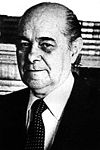 |
1985 Brazilian presidential election, 1985 The 1985 Brazilian presidential election was the last to be held indirectly through an electoral college, represented by the members of the National Congress . Two groups were disputing the succession of President João Figueiredo: the Democratic Alliance and the Democratic Social Party... |
Never took office. | Democratic Movement Party (PMDB) | José Sarney José Sarney José Sarney de Araújo Costa is a Brazilian lawyer, writer and politician. He served as president of Brazil from 15 March 1985 to 15 March 1990.... (PMDB) |
|
| 31 | José Sarney José Sarney José Sarney de Araújo Costa is a Brazilian lawyer, writer and politician. He served as president of Brazil from 15 March 1985 to 15 March 1990.... |
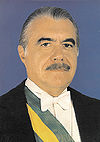 |
— | (Acting President from 15 March 1985) 21 April 1985 |
14 March 1990 | Democratic Movement Party (PMDB) | vacant |
| 32 | Fernando Collor Fernando Collor de Mello Fernando Affonso Collor de Mello was the 32nd president of Brazil from 1990 to 1992, when he resigned in a failed attempt to stop his trial of impeachment by the Brazilian Senate... |
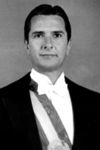 |
1989 Brazilian presidential election, 1989 The Brazilian presidential election of 1989 was the first direct presidential election in Brazil since 1960.-Historical context:On January 15, 1985, Tancredo Neves won the election for president on the electoral college, represented by Deputies and Senators, putting an end to the 21-year-old... |
15 March 1990 | (suspended on 2 October 1992) 29 December 1992 |
Party of the National Reconstruction (PRN) Christian Labour Party The Christian Labour Party is a christian-conservative political party in Brazil.The party was founded in 1985 as Youth Party by Daniel Tourinho, a brazilian lawyer... |
Itamar Franco Itamar Franco Itamar Augusto Cautiero Franco was a Brazilian politician and the President of Brazil from December 29, 1992, to January 1, 1995. During his long political career, Franco was also a Senator, Mayor, Ambassador, Governor and Vice President... (PRN Christian Labour Party The Christian Labour Party is a christian-conservative political party in Brazil.The party was founded in 1985 as Youth Party by Daniel Tourinho, a brazilian lawyer... • PMDB) |
| 33 | Itamar Franco Itamar Franco Itamar Augusto Cautiero Franco was a Brazilian politician and the President of Brazil from December 29, 1992, to January 1, 1995. During his long political career, Franco was also a Senator, Mayor, Ambassador, Governor and Vice President... |
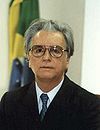 |
— | (Acting President from 2 October 1992) 29 December 1992 |
31 December 1994 | Democratic Movement Party (PMDB) | vacant |
| 34 | Fernando Henrique Cardoso Fernando Henrique Cardoso Fernando Henrique Cardoso – also known by his initials FHC – was the 34th President of the Federative Republic of Brazil for two terms from January 1, 1995 to December 31, 2002. He is an accomplished sociologist, professor and politician... |
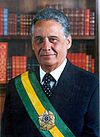 |
1994 1998 Brazilian presidential election, 1998 The 1998 Brazilian general election was held on two rounds. The first round was held on Sunday, October 4. On this date, Fernando Henrique Cardoso was re-elected President and the governorships of 14 states, all seats in the Chamber of Deputies and the state legislative assemblies, and one-third of... |
1 January 1995 | 31 December 2002 | Social Democracy Party (PSDB) Brazilian Social Democracy Party The Brazilian Social Democracy Party is a centrist political party in Brazil. Originally a centre-left party at the time of its foundation, PSDB moved to the centre after Fernando Henrique Cardoso forged an alliance with the right-wing Liberal... |
Marco Maciel Marco Maciel Marco Antônio de Oliveira Maciel is a Brazilian politician. He is a lawyer and a law school professor. He was a founder of the conservative PFL party, former ARENA and was twice elected vice-president in the same ticket as center-right President Fernando Henrique Cardoso, in 1994 and 1998... (PFL Democrats (Brazil) The Democrats is a centre-right political party in Brazil, considered the main in the right-wing spectrum. Despite its former name , the party affiliates itself to the Centrist Democrat International, and the International Democrat Union. The name comes from its support to free market policies... ) |
| 35 | Luiz Inácio Lula da Silva Luiz Inácio Lula da Silva Luiz Inácio Lula da Silva , known popularly as Lula, served as the 35th President of Brazil from 2003 to 2010.A founding member of the Workers' Party , he ran for President three times unsuccessfully, first in the 1989 election. Lula achieved victory in the 2002 election, and was inaugurated as... |
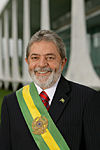 |
2002 Brazilian presidential election, 2002 Although Luis Inácio "Lula" da Silva won the most votes in the first round, he did not manage to obtain majority of valid votes . This led the presidential election to a second round, which Lula won with 61.3% of valid votes.... 2006 Brazilian presidential election, 2006 The Brazilian general elections of 2006 were held in two rounds. The first one happened on October 1, in which eligible voters chose all members of the Chamber of Deputies, one-third of the Federal Senate, and members of the Legislative Assemblies of the 26 states and the Federal District... |
1 January 2003 | 31 December 2010 | Workers' Party (PT) Workers' Party (Brazil) The Workers' Party is a democratic socialist political party in Brazil. Launched in 1980, it is recognized as one of the largest and most important left-wing movements of Latin America. It governs at the federal level in a coalition government with several other parties since January 1, 2003... |
José Alencar José Alencar José Alencar Gomes da Silva , also known as José Alencar, the Strong, was a Brazilian businessman and politician, and the Vice President of Brazil from 2003 to 2010. In business since a young age, Alencar was a self-made multimillionaire, as the chief executive of Coteminas, after working as... (PRB Brazilian Republican Party The Brazilian Republican Party is a Brazilian political party. Its electoral number is 10 and it became a registered political party on August 25, 2005. The Igreja Universal do Reino de Deus uses the party to elect its bishops in Brazilian elections... ) |
| 36 | Dilma Rousseff Dilma Rousseff Dilma Vana Rousseff is the 36th and current President of Brazil. She is the first woman to hold the office. Prior to that, in 2005, she was also the first woman to become Chief of Staff of Brazil, appointed by then President Luiz Inácio Lula da Silva.... |
2010 Brazilian presidential election, 2010 The Brazilian presidential election was held in 2010 with two rounds of balloting. The first round was held on October 3 along with other elections as part of the 2010 general election... |
1 January 2011 | Incumbent | Workers' Party (PT) Workers' Party (Brazil) The Workers' Party is a democratic socialist political party in Brazil. Launched in 1980, it is recognized as one of the largest and most important left-wing movements of Latin America. It governs at the federal level in a coalition government with several other parties since January 1, 2003... |
Michel Temer Michel Temer Michel Miguel Elias Temer Lulia , better known as Michel Temer, is a Brazilian lawyer and politician, and currently the Vice-President of Brazil after winning on the ticket of Workers' Party candidate Dilma Rousseff... (PMDB) |
|
See also
- List of Presidents of Brazil by longevity
- List of First Ladies of Brazil
- History of BrazilHistory of BrazilThe history of Brazil begins with the arrival of the first indigenous peoples, thousands of years ago by crossing the Bering land bridge into Alaska and then moving south....
- List of Brazilian monarchs
- List of Brazilians

